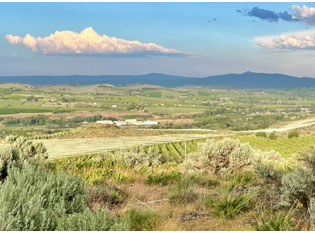This project seeks to characterize human and environmental wellbeing in the IMW at multiple scales of decision-making, action, and experience (place, county, watershed, etc.). Current community-based research and engagement is focused on communities in the Yakima River Basin in Washington.

Objectives:
- We are examining wellbeing patterns across the IMW and study areas to identify disparities and to highlight important units of analysis specific to governance related to sustainability and resilience in the Intermountain West.
- Yakima River Basin community interviews seek to understand community wellbeing experiences, with specific focus on food sovereignty, demographic changes, water and environmental changes, and rural-urban connections.
- We intend to expand our community-based research and engagement to other study areas over time and to assess alignments and misalignments between secondary data indicators and local perspectives.
Charter Summary:
Human wellbeing can be broadly conceptualized as everything “that constitutes a good life” (Bache and Reardon 2016, p. 5). Debate continues over the definition, scope, and measurement of wellbeing and countless objective and subjective measures and metrics are used for governance and research purposes (ibid.). This charter compiled an initial large set of datasets and measures for wellbeing and social and environmental conditions and characteristics across the Intermountain West. These measures range from the Social Vulnerability Index to multiple measures of watershed health and integrity and beyond. In addition to quantitative wellbeing datasets, qualitative place-based perspectives are integral to understanding and characterizing wellbeing and opportunities for guided transformations for greater resilience. We conducted interviews in communities in the Yakima River Basin and reported findings to local leaders. By comparing wellbeing indicators with local-regional perspectives, clearer insights will be obtained for the Intermountain West looking into the future.
Primary Contacts
- Courtney Flint (USU)
- Jessica Schad (USU)
Graduate Students
- Alex Theophilus (USU)
- Emma Epperson (USU)
- Rebecca Gustine (WSU)
Former Staff & Faculty
- Bailey Holdaway (USU), 2021 – 2023
- McKayle Law (USU), 2024
- Claudia Méndez Wright (CWU), 2023 – 2024
- Casey Trout (USU), 2021 — 2022
- Sarah Wilson (USU), 2023
Former Undergraduate Students
- Madison Fjeldsted (USU), Fall 2023 & Spring 2024
- Haley Munson (USU), Fall 2023
- Claudia Romo (CWU), Fall 2023
- Makenzy Whittekiend (USU), Fall 2023
- Logan Garnica (USU), Summer 2023
- Kaden Peterson (USU), Fall 2023
- Rebekah Richey (USU), Summer & Fall 2023
- Jacob Lancaster (USU), Spring 2023
- Patrick Gee (USU), Spring 2023
Publications:
- Gustine, R., Theophilus, A., Flint, C., Ulrich-Schad, J., Epperson, E., Mendez Wright, C., Adam, J. “Managing beyond water: utilizing community well-being interviews in the Upper Yakima River Basin, USA, for climate change adaptation.” Ecology and Society. 2025. https://doi.org/10.5751/ES-15809-300107
- Theophilus, A., Ulrich-Schad, J.D., Flint, C.G. “Community-Level Food Sovereignty and Wellbeing in the Upper Yakima River Basin: Framing Lived Experiences within Multi-Scalar Food Systems Discourse.” Sociological Inquiry. 2025. https://doi.org/10.1111/soin.70006
- Theophilus, A., Ulrich-Schad, J.D., Flint, C., Epperson, E. “Amenity Migration and Community Wellbeing in Washington’s Kittitas County Post-COVID-19 Pandemic.” Rural Sociology. 2025. https://doi.org/10.1111/ruso.12590
Community Reports:
The following reports were written to be a public-facing component of the research conducted by the PC13 Characterizing Wellbeing research team in the Upper Yakima River Basin. This research team conducted 121 interviews with residents of 6 communities during 2023, and wrote reports on findings from these interviews at the request of 5 of the communities included in the study. These reports summarize interview member perspectives on salient issues to wellbeing in Upper Kittitas County (comprised primarily of Cle Elum and Roslyn), Ellensburg, Tieton, and the city of Yakima. Each report discusses four broad categories that represent topics of discussion during interviews. These categories include aspects of life that contribute to community member wellbeing, topics of concern that may negatively impact wellbeing, areas of excitement when looking towards the future, and regional connections to other communities.
Preliminary versions of each community report were sent to many key community contacts for feedback in the Spring of 2024. Feedback was incorporated into reports and reports were finalized in the early Summer of 2024. Additionally, the research team worked with key informants to discuss appropriate platforms for sharing findings with broader community audiences. The PC13 research team members gave a presentation and held a question and answer session to the Yakima County Commission regarding the Yakima and Tieton reports. Additionally, research team members presented to the Ellensburg City Council and Planning Commission, and answered subsequent questions. Research and engagement are ongoing with Upper Kittitas County to explore the role of tourism and environmental change on outdoor recreation.